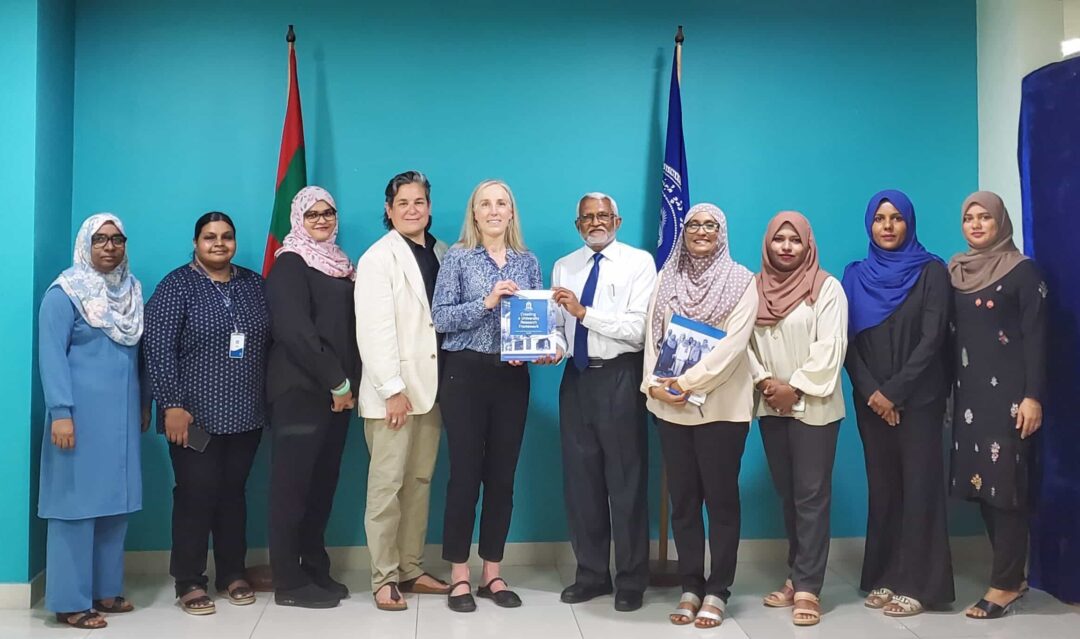
PROJECT UPDATE
Project Overview
This initiative supported the Government of the Maldives’ Ministry of Tourism and Environment and Maldives National University to strengthen research capacity on climate change in the Maldives.
Project Profile
The Technical Assistance Partnership—Expert Deployment Mechanism (TAP-EDM) initiative and Canadian experts Jenn Hoffman, Robin Cox and Michelle Hamilton-Paige collaborated with the Government of Maldives’ Ministry of Environment, Climate Change and Technology (MECCT) and the Maldives National University (MNU) to enhance MNU’s capacity to research climate change and environmental sustainability for Small Island Developing States (SIDS).
The initiative aimed to strengthen the MNU’s ability to provide the MECCT, along with other government agencies, with high-quality, reliable climate data. This data would be thoroughly analyzed and interpreted to aid evidence-based policy making, program development, monitoring, and climate change negotiations. The goal was to enhance the entire research process, covering aspects beyond research itself, including (i) design, (ii) planning, costing, and fundraising, (iii) process management, (iv) data handling, (v) data analysis and interpretation, and (vi) report writing. The broader objective was to improve the Maldives government’s capacity to forecast and respond to climate change impacts. Access to improved data was essential for reducing climate-related damages and also helped the Maldives (and possibly other Small Island Developing States) in negotiations over loss and damage support.
Key Deliverables
- Capacity Support and Training
- Held diagnostic deployment consultations to identify institutional research needs and gaps
- Facilitated workshops to co-develop strategic goals, guiding principles, vision and research priorities
- Conducted sessions to map and set priority research themes
- Facilitated an institutional transformation and strategic direction session
- Organized a workshop to forge academic and policy linkages
- Provided virtual training and a toolkit on data management planning
- Conducted data management training and final implementation planning workshops
- Technical Support and Knowledge Products
- Developed a practical workbook to guide research planning and implementation
- Produced a toolkit on institutional transformation from a teaching university to a research university
- Delivered a webinar and toolkit on data management planning, integrated into teaching
- Created a research data management checklist embedded within the research framework workbook
- Designed a five-year climate and environment research framework with an implementation plan template
Project Outcomes and Lessons Learned
The initiative enhanced the Maldives National University’s capacity to fund and conduct climate change research, supporting the development of climate-resilient and sustainable communities.Key lessons learned include the importance of early engagement, user-centered design, and inclusive facilitation. Clear institutional coordination and meaningful stakeholder participation—particularly ensuring women and gender minorities are heard—were essential to usability, adoption, and sustainability.
Direct Project Reach:
- 85 participants engaged through activities conducted and project deliverables
Public Engagement (Canada):
- 83 Canadians reached through outreach and engagement activities
Public Engagement Activities:
- Canadian experts Jenn Hoffman, Robin Cox and Michelle Hamilton-Paige:
- Participated in the TAP Climate Action Forum in Halifax and a Facebook Live event
- Attended the TAP-EDM 4th Knowledge Harvest and Closing Event in Montreal
- Published a blog article Partnering for Resilience: Strengthening Climate Research in the Maldives



